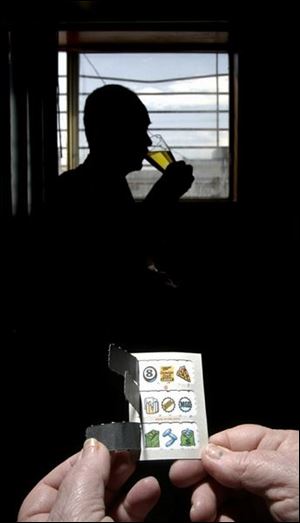
Law regulates fraternal, veteran groups' gambling
3/12/2003
Instant bingo and other forms of gambling soon will be legal in fraternal and veterans' organizations.
Gambling at Ohio's veterans' posts, fraternal lodges, and churches is about to change. Odds are, the debate over it has only just begun.
“There's a lot of our clubs right now that just want to turn in their charter and close down,” said Karl Schnipke, an angry secretary of the Fraternal Order of Eagles, 5050 Jackman Road.
The changes to the state's Charitable Gambling Law, which go into effect April 2, legalize much of the illegal gaming that has been going on for years inside many of those clubs.
But as a trade-off, it dictates that most of the proceeds be returned to charity.
“My logical conclusion is that I'm not going to come in and create a law saying you can or can not do this,” said State Rep. Jon Husted (R., Kettering), the sponsor of the bill that Governor Bob Taft signed into law in January. “But if you're going to [gamble], you're going to do it legitimately.”
Over the years, gambling at some neighborhood lodges has become a sort of a “don't ask, don't tell” routine: a raffle at the bar among members or instant bingo cards at the neighborhood fish fry.
From time to time, such places were raided by Ohio Department of Public Safety liquor agents. Gambling in Ohio is legal only under very limited conditions: by the state-authorized lottery, by charitable organizations running licensed bingo games, or when all the profits go to certain IRS-recognized charities.
In fact, more than two dozen fraternal and veterans' organizations in northwest Ohio were charged in 2001 and 2002 with a total of 112 gambling violations for running games such as raffles, punch boards, and dice games, according to state records.
If found guilty of the violations, organizations face possible suspension or loss of their liquor permit and fines up to several thousand dollars.
“Years ago, it was `Who cared?' It was a bunch of guys at the club playing tip books,” said Joe Hartman, 63, who belongs to AmVets, Eagles, and Elks lodges in Tiffin. “But then it got out of hand. There were jars for this and tickets for that.”
Still, the profits from the games - at least for a few organizations - often made it worth the risk of being busted.
Dwindling memberships have meant fewer dues, and many of the organizations have reached beyond the traditional steak dinners and chicken barbecues to meet basic operational costs, such as utilities, said Gary Arquette, an investigator with the Lucas County Veterans Services Commission.
Though he said he does not endorse the gambling, Mr. Arquette said instant bingo cards, also known as tip tickets or pull tabs, are a relatively easy way to make money needed to keep veterans posts and other organizations functioning for aging members.
“These guys are 70, 80 years old,” Mr. Arquette said. “They can't be standing over a hot barbecue.”
Even when conducting legal gambling, there were other violations occurring.
Current law suggests that proceeds from legal gambling, such as licensed bingo games, are supposed to go to charity. But that has largely been ignored, said Mark Gribben, spokesman for Attorney General Jim Petro.
“They figured the lodge is doing good works by having all these guys get together and once a year go out and clean up a river,” Mr. Gribben said. “If they drink the beer the other 51 weeks of the year, they think that's OK. Well, it's not.”
The new law allows instant bingo cards, raffles, and punch boards but clearly delineates where the proceeds go: 50 percent to an independent charity, 20 percent for an organization's own charity work, and 30 percent for operating the games.
“This [profit] can't go to the beer they're keeping in the cooler while they're cleaning up the river,” Mr. Gribben said. “But it could go for the plastic bags they're using to pick up the trash.”
Other charitable organizations, such as churches, must give 70 percent to charity. Thirty percent may be kept for expenses.
The new law also sets up three licenses for gambling. One would allow bingo games; another, instant bingo cards. A third license permits both.
However, video poker machines and other devices that have a video display and are operated by coins or tokens remain illegal under the new law.
Despite this, the new law has supporters.
Michael Pituch, finance officer at the American Legion, Post 135, 2404 West Sylvania Ave., said the law aids in fund-raising for those organizations that previously would not sell the tickets because they were illegal.
“The only people who are really going to be hurt are the ones who aren't following the rules anyway,” he said.